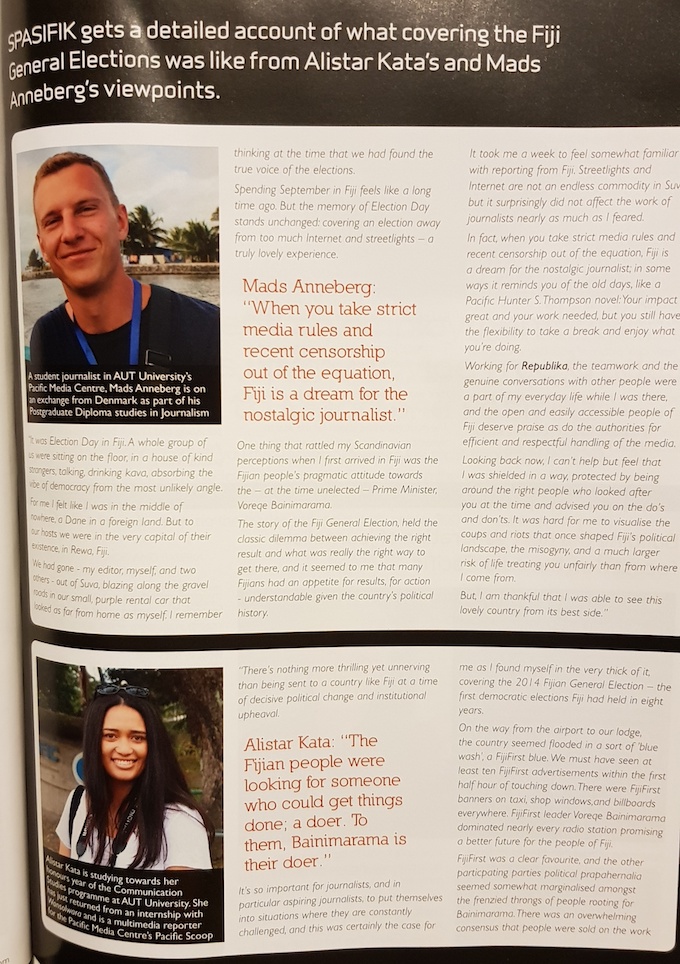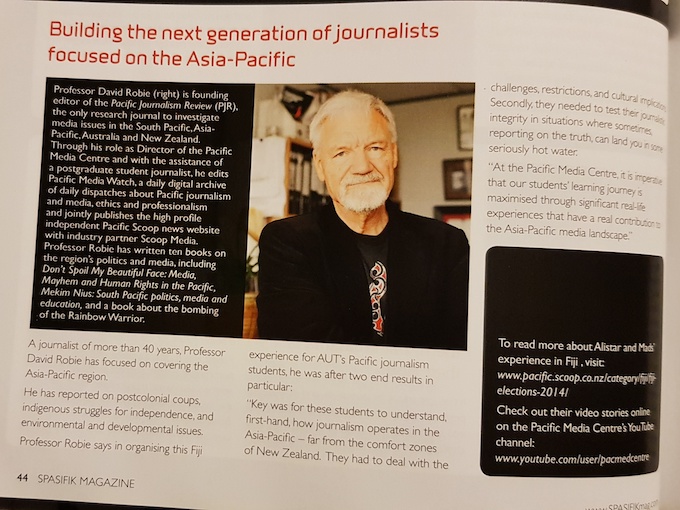Spasifik Magazine
After the Fiji military coup of 5 December 2006, caretaker Prime Minister Jona Senilagakali announced that elections would take place “hopefully in 12 months, two years”. Later it was made clear to the Fijian people that none of the ministers in the interim government would be allowed to contest the elections.
Fast forward eight years and Fiji’s first general elections since 2006 were finally held on 17 September 2014 to select the 50 members of the new Fiji Parliament.
The new constitution signalled a new era for Fijians; for the first time in eight years they felt they had a say in the direction the country would take over the next few years. The new constitution lowered the voting age to 18 and gave the right of multiple citizenship to Fijians for the first time. Voreqe (Frank) Bainimarama, this time standing for the FijiFirst Party, was elected Prime Minister.
For a group of AUT University Asia-Pacific journalism students, the elections presented an opportunity for them to delve deep into the world of Pacific political journalism and uncover many untold truths about life in Fiji during this new era of political freedom.
They were also the first New Zealand university student journalists to cover a general election in the Pacific.
As this article was going to press, the students were told they had been awarded the Ossie Award for Best Use of Convergent Media for their Fiji coverage at a ceremony in Sydney organised by the Journalism Education and Research Association of Australia (Jeraa).
The AUT student news bureau comprised of student journalists Alistar Kata and Mads Anneberg, who reported on the elections through a Fiji-based internship with local media, while coordinating editor Thomas Carnegie (abive), based at the Pacific Media Centre and Pacific Scoop in Auckland, managed the publication and distribution of their stories.
Professor David Robie: “This was a great opportunity for New Zealand-based student journalists to experience an historic election coming eight years after the 2006 coup.”
Kata was based at the University of the South Pacific’s student journalism newspaper Wansolwara and Radio Pasifik, while Anneberg was based at Repúbika magazine in Fiji.
“This was a great opportunity for New Zealand-based student journalists to experience an historic election coming eight years after the 2006 coup,” says Professor David Robie, director of AUT University’s Pacific Media Centre.
“It follows the tradition of having students from our Asia-Pacific Journalism course reporting on the Pacific Islands Forum over the past four years.”
Anneberg says covering the elections was an “amazing experience”.
“As a young reporter in Denmark, I had never reported on anything where the stakes were even as remotely as high for the readers.”

Professor Sudesh Mishra, head of the University of the South Pacific’s School of Language, Arts and Media, says the USP-AUT partnership was significant.
“We were thrilled to be hosting graduate journalists from our sister university in Auckland. Cross-institutional exchanges and attachments are a vital part of what we do since our students stand to benefit from working with their counterparts from abroad.”
Ricardo Morris, editor of Repúblika, adds it was a great opportunity for journalists-in-training from a close major neighbour of Fiji to observe the country’s transition back to parliamentary democracy after eight years of rule by decree.
“Not only will it be a new experience for our New Zealand colleagues, very few local journalists left in the industry have covered the previous or any other election.
“For all of us, the electoral system was completely new and for the first time voters were not compelled by law to vote along ethnic lines,” says Morris.
The new proportional representational system required voters to make only a single choice from a field of almost 250 candidates for 50 parliamentary seats. To explain the changes in Fiji’s electoral system to voters — or an audience back in NZ — required a thorough understanding of the system and the tallying of votes and distribution of seats.
‘Blue wash’, elections and Fiji’s reborn democracy. Video: Alistar Kata (Pacific Media Centre)
“Alistar and Mads took on the challenge with relish, and it was refreshing to hear their take on the democratic processes,” says Professor Robie.
Kata described the situation in Fiji as “real and tentative”.
“For me, it was a golden opportunity to use what I have been learning through the course this year,” she says.
Carnegie is aiming for a career in political journalism in the Asia-Pacific region.
“This was a great opportunity for me to develop my knowledge and understanding of the political system,” he says.
Under the Fiji government’s media decree, the student journalists were required to register with the Media Industry Development Authority (MIDA) and gain permission to report on the elections.

Republished from Spasifik Magazine, Summer 2015, issue No 63, pp. 42-43.

